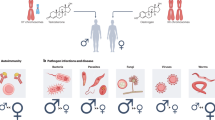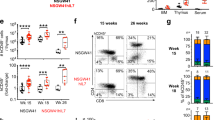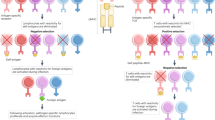Abstract
A NATURALLY occurring thymocytotoxic autoantibody (NTA) has been found in significant titre early in life in NZB mice1. This antibody is present in almost all NZB mice by 3 months of age, and is associated with an age-dependent loss of T cells in these mice2–4. NTA may be responsible for an initial loss of suppressor T cells in NZB mice and thereby contribute to the development of autoimmunity. Although other mouse strains (NZW, C57BL/6J, AKR/J, BALB/cJ, and 129) may produce NTA later in life, the prevalence and titre of NTA is much lower than in NZB mice. NTA reacts with brain- and thymus-derived cells as well as thymocytes, but not B cells or non-lymphoid abdominal organs1–5. In contrast to standard anti-θ serum, NTA can combine with both Thy 1.1 (θ-AKR) and Thy 1.2 (θ-C3H)1,6. Genetic factors have been implicated in the development of autoimmunity in New Zealand mice7,8. In addition, X-linked immune response genes have been described for synthetic9 and naturally occurring10 nucleic acids. Moreover, female hybrids (NZB/NZW) develop a more severe disease than males. We therefore undertook the present study to determine the contribution of the X chromosome to the development of NTA.
This is a preview of subscription content, access via your institution
Access options
Subscribe to this journal
Receive 51 print issues and online access
$199.00 per year
only $3.90 per issue
Buy this article
- Purchase on Springer Link
- Instant access to full article PDF
Prices may be subject to local taxes which are calculated during checkout
Similar content being viewed by others
References
Shirai, T., and Mellors, R. C., Proc. natn. Acad. Sci. U.S.A., 68, 1412–1415 (1971).
Shirai, T., and Mellors, R. C., Clin. exp. Immun., 12, 133–152 (1972).
Shirai, T., Yoshiki, T., and Mellors, R. C., Clin. exp. Immun., 12, 455–464 (1972).
Shirai, T., Yoshiki, T., and Mellors, R. C., J. Immun., 110, 517–523 (1973).
Gelfand, M. C., Parker, L. M., and Steinberg, A. D., J. Immun., 113, 1–8 (1974).
Parker, L. M., Chused, T. M., and Steinberg, A. D., J. Immun., 112, 285–292 (1974).
Howie, J. B., and Helyer, B. J., Ann. N. Y. Acad. Sci., 124, 167–177 (1965).
Talal, N., and Steinberg, A. D., Current Topics in Microbiology and Immunology, 64, 79–103 (Springer, New York, 1974).
Scher, I., Frantz, M. M., and Steinberg, A. D., J. Immun., 110, 1396–1401 (1973).
Mozes, E., and Fuchs, S., Nature, 249, 167–168 (1974).
Steinberg, A. D., Pincus, T., and Talal, N., Immunology, 20, 523–531 (1971).
Author information
Authors and Affiliations
Rights and permissions
About this article
Cite this article
RAVECHE, E., KLASSEN, L. & STEINBERG, A. Sex differences in formation of anti-T-cell antibodies. Nature 263, 415–416 (1976). https://doi.org/10.1038/263415a0
Received:
Accepted:
Issue Date:
DOI: https://doi.org/10.1038/263415a0
Comments
By submitting a comment you agree to abide by our Terms and Community Guidelines. If you find something abusive or that does not comply with our terms or guidelines please flag it as inappropriate.



